Dreams of land deferred
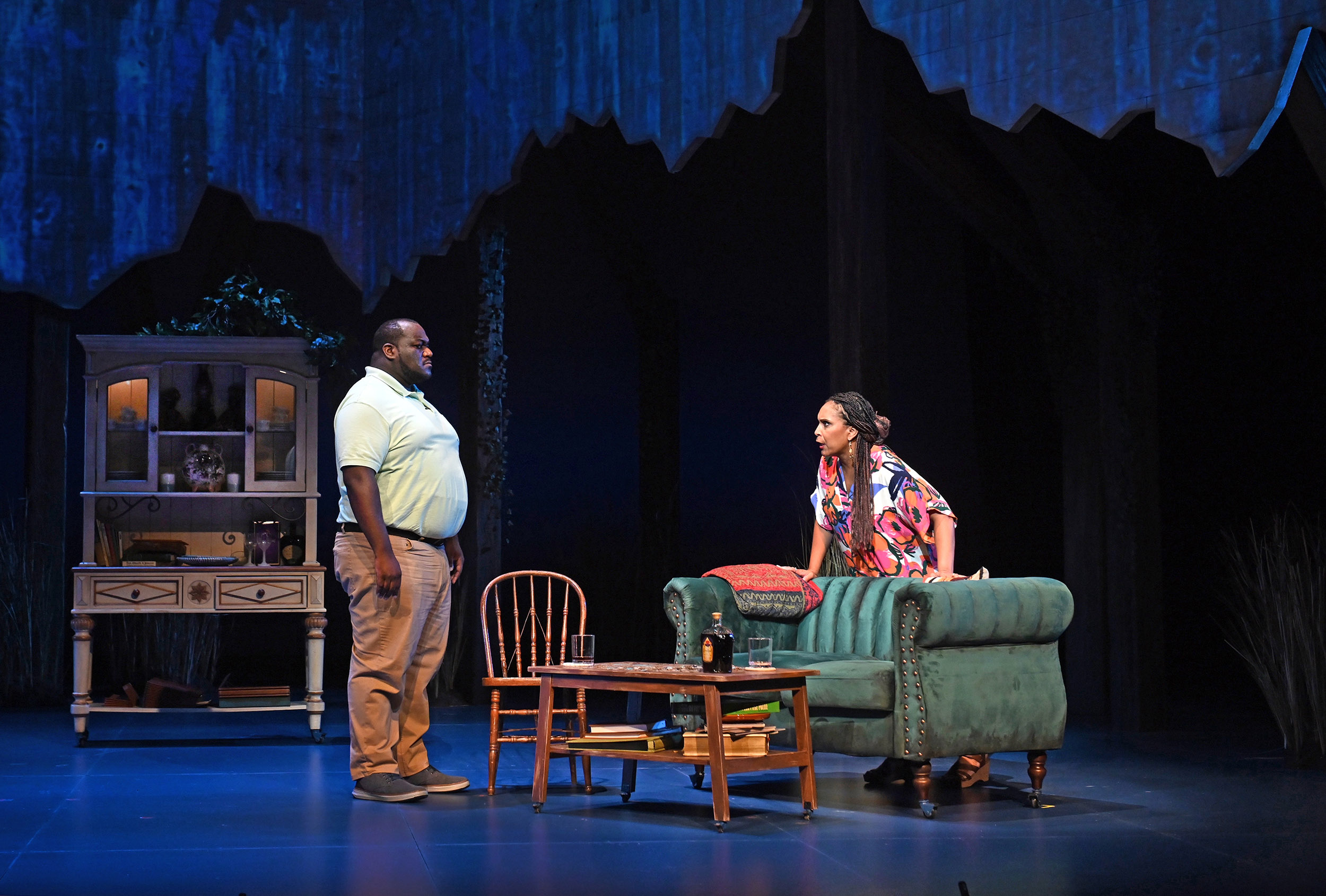
Castor (Reginald Smith Jr.) and Patience (Talise Trevigne).
Photos by Philip Groshong
Tracy K. Smith’s new opera explores nation’s long history of systematic barriers to Black ownership
CINCINNATI — Two cousins meet at a crossroads during the 2008 recession in the new opera “Castor and Patience” by Tracy K. Smith and Gregory Spears. It tells the story of Castor, who as a child moved away from his family’s ancestral home in the South, and now is in desperate financial trouble due to a bad mortgage. He visits Patience, who still lives on the land, to ask whether he — as an heir — can sell some of it to ease his burdens. Patience, a committed steward of the land, refuses.
The audience has watched the story unfold over nearly three hours when Patience turns her gaze and words on them. “What do you owe him?” she asks.
The Cincinnati Opera production, whose debut run wrapped up Friday, leaps back and forth in time and space to explore the struggles of a single extended family. But it also relates a larger history of how structural racism has resulted in massive property losses for Black Americans ever since Emancipation, and how those betrayals helped shape a people.
Which is what makes Patience’s breaking the fourth wall an essential component of the opera, said Smith, the librettist.
“I very much didn’t want to make something about which an audience member could say, ‘That’s about all those Black folks way down in the South and way back in the past. This is their problem.’ Because it’s not. This is an American problem,” said Smith ’94, a professor of English and of African and African American Studies, and the Susan S. and Kenneth L. Wallach Professor at the Harvard Radcliffe Institute.
Librettist Tracy K. Smith (from right), composer Gregory Spears, and conductor Kazem Abdullah attend a workshop of the opera.
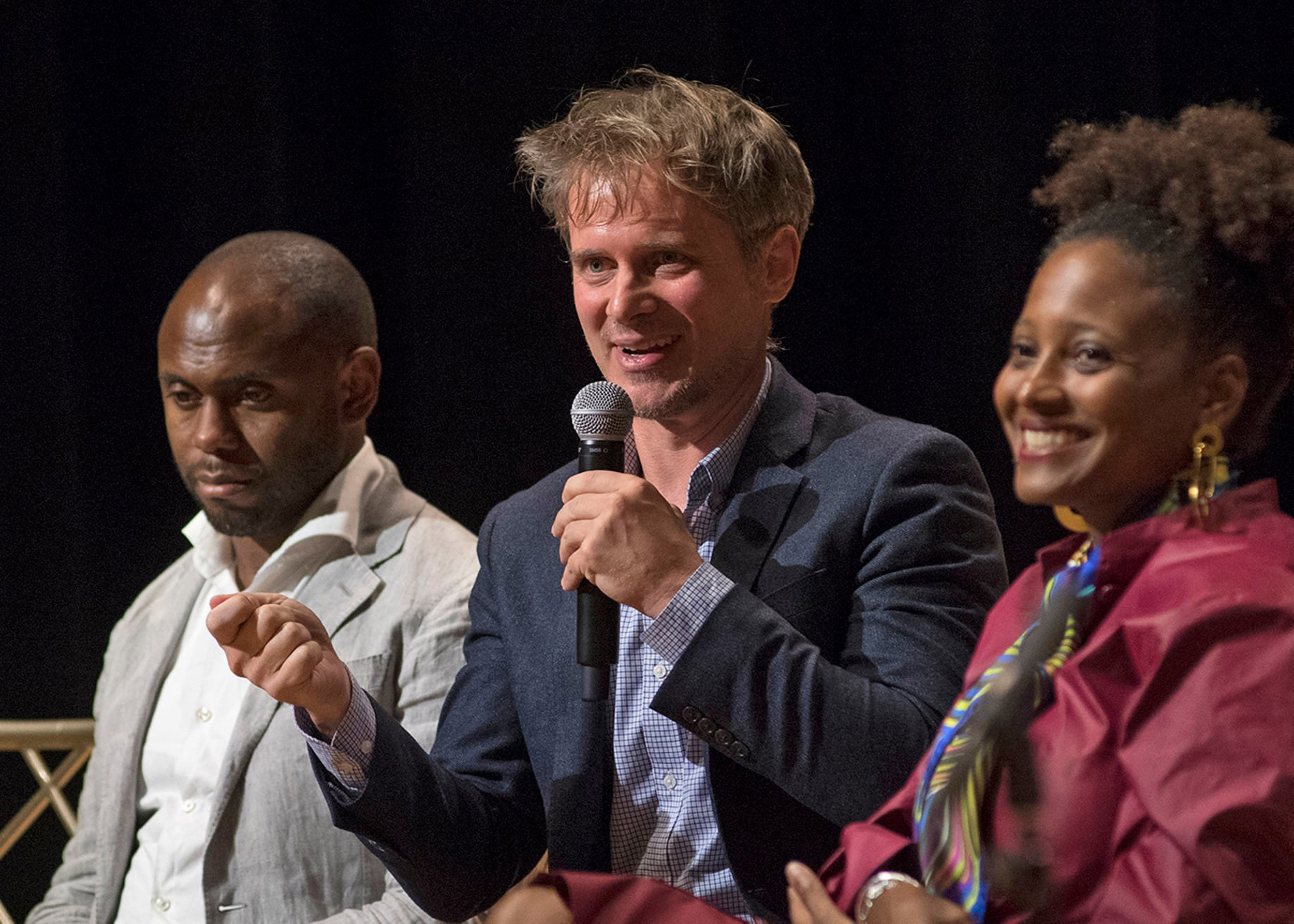
Smith and the opera’s composer, Spears, started working on “Castor and Patience” about six years ago, taking research trips to Georgia and South Carolina to interview people about the history and contemporary lives of Black people in those regions, more than two centuries after many of their ancestors were promised land ownership as part of their emancipation from enslavement.
The opera moves through time from the enactment of the Emancipation Proclamation in 1862 to Reconstruction to the 1960s to 2008. At times, characters from all three periods share the stage, embodying a major theme: the omnipresence of history across time, place, and experience. Patience and her children teach Castor’s wife and kids about the layers of family legacy that live in their environment, and Castor’s children reflect on the privileges and problems of their contemporary lives in Buffalo, N.Y.
With these tensions at its core, “Castor and Patience” is at once an intimate family story of betrayal and healing and a reckoning about national pain, said Smith. The opera’s subtle and warm music (conducted by Kazem Abdullah) evoked the languid feeling of the Southern summer, and changing video projections by Rachel Eliza Griffiths helped guide the audience around the physical environment and different time periods.
The opera moves through time from the enactment of the Emancipation Proclamation in 1862 to Reconstruction to the 1960s to 2008. At times, characters from all three periods share the stage.
“The moment of crisis in this story — the 2008 recession — is one we’ve all lived through, and it’s one that’s rooted in a deep past that we may not be aware of. So it’s no accident that Castor and his family are facing this economic crisis, because the groundwork for it was laid before Reconstruction,” said Smith.
“I hope we created a roadmap to show that the redlining, the bad mortgage loan, the exponential feeling of pressure that this family faces isn’t necessarily a result of poor planning on their part. It’s the result of a very deliberate plan that was laid by people with power. If we choose not to think about our actions and the systems we participate in, then we essentially consent to sustaining the force of that age-old plan.”
The resonance of that history expands beyond the world of “Castor and Patience” to its staging in Cincinnati. The city has been the site of historical and contemporary issues of disinvestment in communities of color, gentrification, and real estate discrimination against Black residents, Smith noted.
Director Kevin Newbury agreed. “This story takes place on the Southern coast, but we are right here in the middle of where so much of this history was born,” he said, referring to the Ohio River, which runs along the Southern edge of the city and once partly demarcated free from slave-holding states. “The opera is about the relationship with the land, with the soil, with our country, with the deeply problematic systemic racism in this country. So it feels like the right piece at the right time and the right place to show it.”
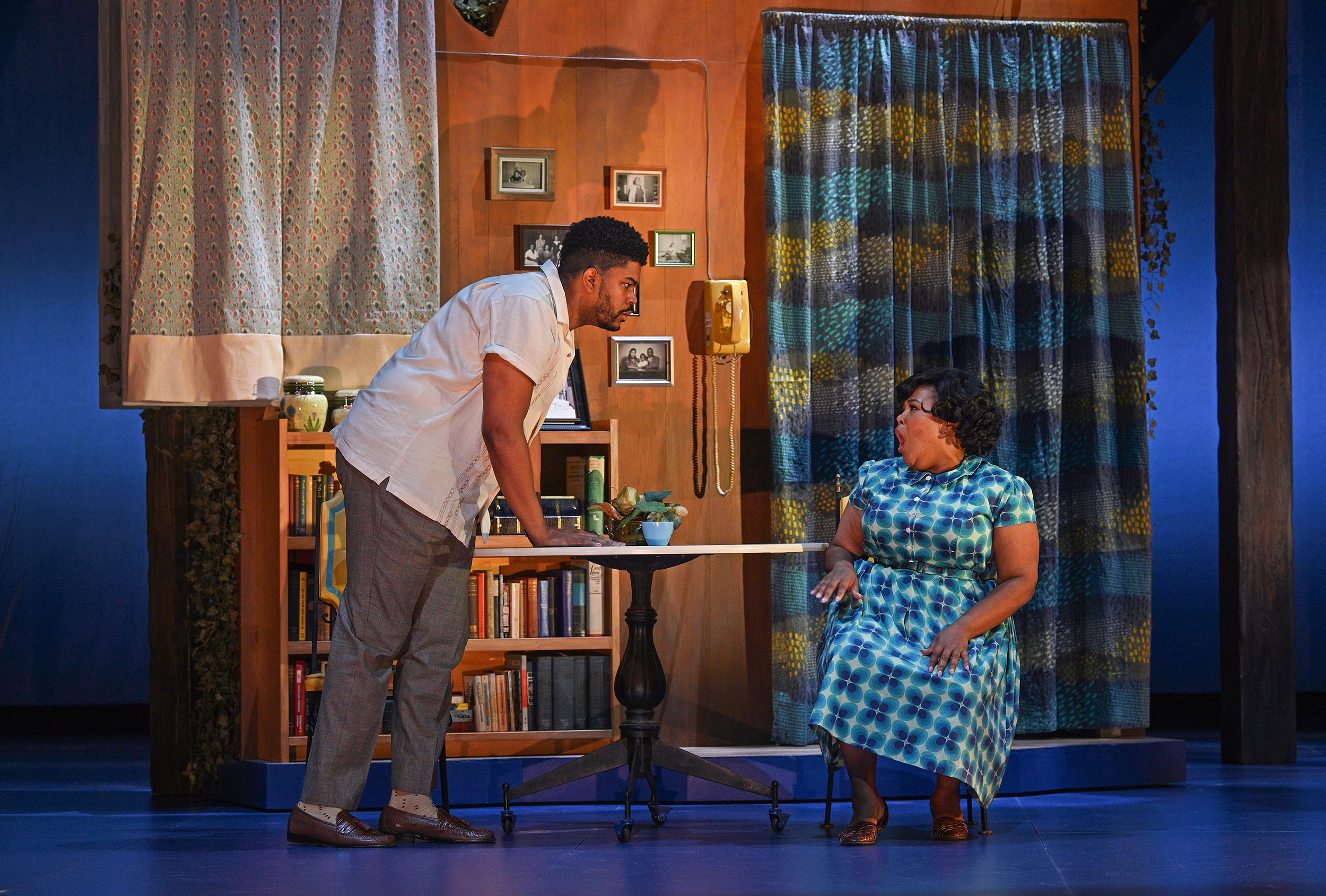
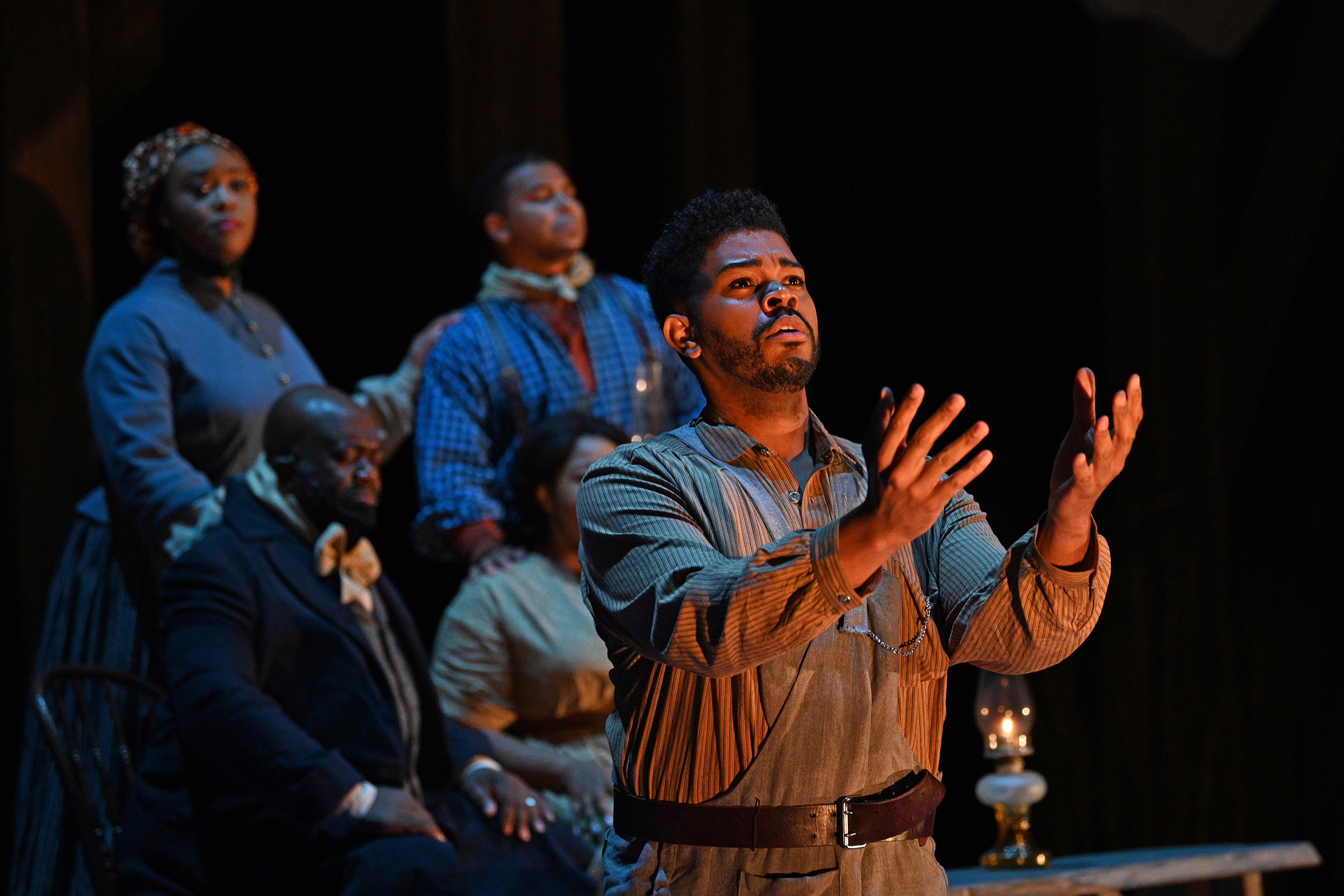
Castor’s parents; congregants gather at a service.
Patience was the right role for soprano Talise Trevigne, who said she had never gotten to play a woman who was so like herself and her female relatives before, and saw her own family’s struggles to maintain ownership of land in the story of Castor and Patience.
“I always say that I didn’t come to Patience, but Patience found me quite organically,” said Trevigne, whose credits include leading roles in “Madama Butterfly” and “La bohème.” Trevigne lives in Georgia, and her family is Creole from New Orleans, with a history she saw reflected in the material.
“I’m very familiar with the housing crisis [after] Hurricane Katrina, the loss of land, and all of those things. All the intricate details [in the opera] of how deeds were transferred to sharecroppers, and how these were not upheld, over time, throughout generations—that is very much a part of my own family history,” she said.
Despite her kinship with the character, being the first person to take on a brand-new role was challenging. It was also deeply rewarding.
“There’s a pressure that I probably put on myself because I’m creating the character for the first time and I want it to be special,” said Trevigne. “It’s a challenge and a slower process, but also a rewarding and exciting one because we set the bar for all the Patiences that come after me.”
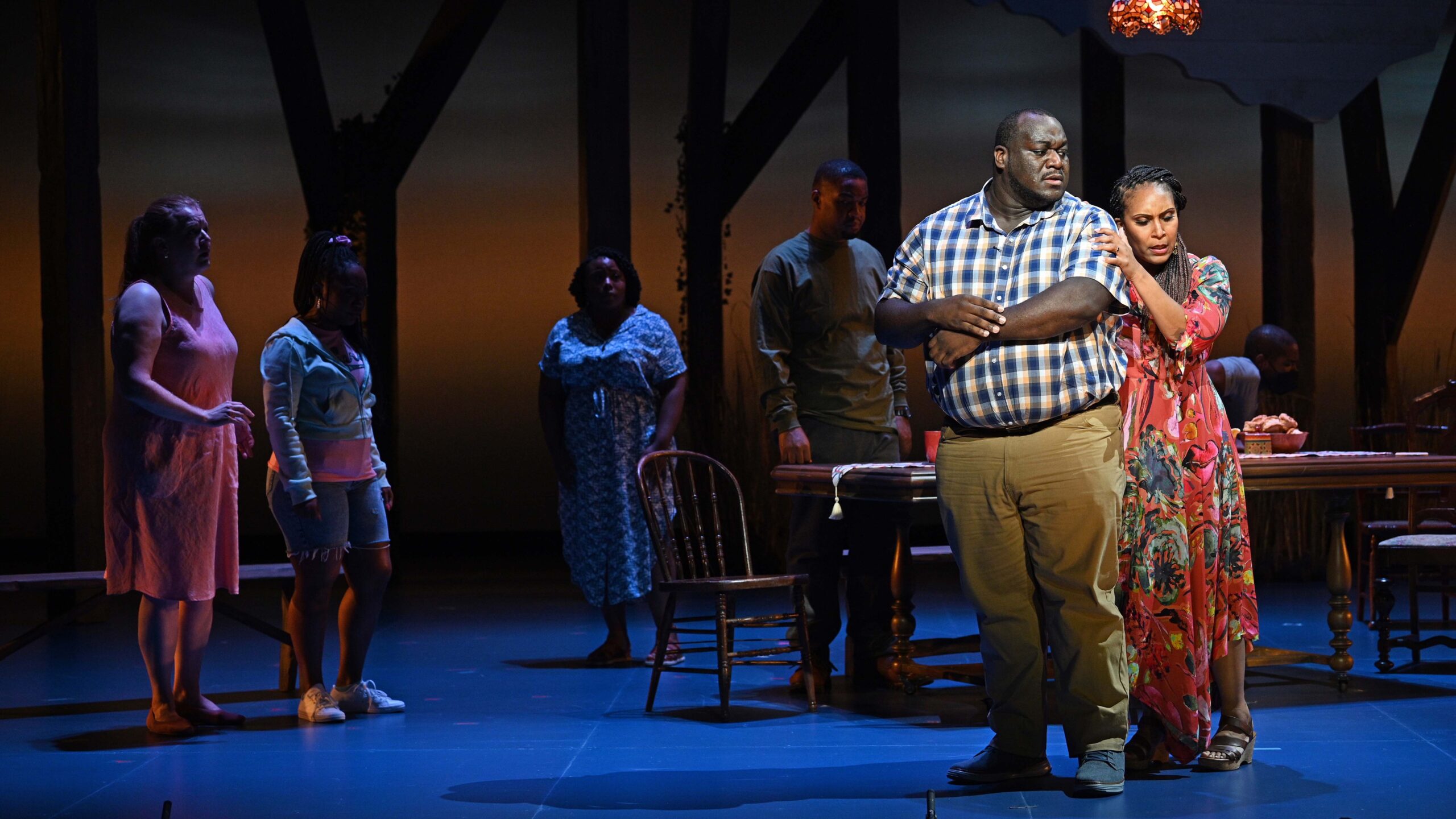
Trevigne is one of 12 cast members in the show, and all but one are Black. For Smith, the chance to write for Black performers and see them work together on stage was deeply affecting.
“This is a cast telling an American story, but one about their own lives as well,” she said. “This is the America that we don’t see enough of.”
Smith is a relative newcomer to opera, and “Castor and Patience” is only her second libretto — she and Spears are planning two more productions as a kind of trilogy on American life. But during dress rehearsals she saw the actors’ interpretations of her words up-close, which helped cement her newfound love of the form. And she also saw how the musical style lent itself well to overlapping time periods, voices, and themes on stage at the same time.
“Opera seemingly distorts reality, but it also brings us more deeply into what reality feels like,” she said. “The first place that occurs is the aria, and I feel now like there are several moments in every day where I need an aria to express the largeness of feeling, rage, joy, conflict, or desperation, that breaks in on me.”
Beyond the form, she said, the process of creating “Castor and Patience” altered her understanding of her own work and its relationship to history.
“This work — and the research that it required — changed my creative life,” she said. “Within the last year or two, the poems that I’ve been writing, and a lot of the thinking and even the teaching that I’ve been doing, has to do with the convergence of past and present. I love the way [literary and historical scholar] Saidiya V Hartman describes it, the fact that we’re working in collaboration and simultaneity with our ancestors.
“I claim that, and I believe that there’s a psychic dimension that I’m engaging with which assures me that not only is this history not over, but the people who are invested in it are not gone,” she added. “And it seems like what we’re called to do — we who care — is an intergenerational kind of work that will perhaps take longer than our lifetimes, but that we must play a part in completing.”







